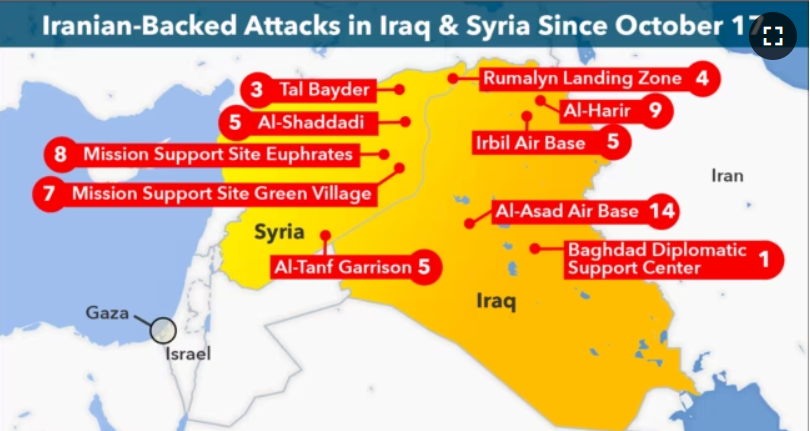Virendra Pandit
New Delhi: Although Iran has yet to respond in kind—it has for long been only threatening the US of dire retaliation—the American attacks on Iranian-linked targets in the Middle East on Friday have pushed it down deeper into the volatile region’s inferno.
The US launched airstrikes against Iranian forces and militias in Syria and Iraq as retaliation for the drone attack that killed three American soldiers, pulling the Joe Biden administration even deeper into the conflict in an election year marked with uncertainties, the media reported on Saturday.
The Gulf War erupted on October 7, 2023, when in a daring daylight invasion well-armed Hamas terrorists struck Israel, killing nearly 1,200 people, and taking some 250 Israelis and foreigners hostage before they returned to their underground tunnel-networked Gaza Strip.
The Gaza War has since been raging, even after the death of over 26,000 people, the wanton destruction of Palestinian areas, and multiple attempts at ceasefire to free the remaining hostages.
On Friday, American aircraft, including long-range B-1 bombers, flying from the US, struck 85 targets at seven locations linked to Iran’s Islamic Revolutionary Guards Corps (IRGC)’s Quds Force and to militant groups Iran funds, the US officials said. Their targets included command-and-control facilities and supply depots for rockets, missiles, and drones, US Central Command said.
The American airstrikes came in response to the January 28 attack on a US base in Jordan, in which three soldiers were killed and many more were wounded.
President Joe Biden had sought to calibrate the US response to send a message to Iran and degrade the militant groups’ ability to attack American forces while avoiding a larger conflict.
“Our response began today,” he said in a statement, adding “It will continue at times and places of our choosing.”
More strikes will take place “in the coming days,” National Security Council spokesman John Kirby told reporters. For now, however, the US refrained from directly attacking Iranian territory, which would have immediately provoked Tehran’s counterattack and risked war with a key regional adversary.
In the last four months of the Gaza War, the US has increasingly sunk deeper into the conflict, launching repeated strikes to defend US troops in Syria and Iraq, and targeting Iran-backed Houthi militants in Yemen that have hit commercial shipping in the Red Sea, a vital trade waterway.
The fresh US attacks came days before Secretary of State Antony Blinken’s latest return to the volatile region to help secure a ceasefire and hostage deal in Gaza that officials believe could serve as a tentative step toward ending the conflict between Israel and Hamas.
While backing Israel’s right to defend itself after the Hamas attack four months ago, US officials believe a ceasefire could help ease tensions and deny Iranian proxies a reason to keep attacking American forces.
The US bases scattered across Iraq and Syria had come under attack more than 160 times in the weeks since Hamas’s October 7 attack on Israel, though no US soldiers had been killed until last week.
The US blamed last week’s deadly attack on an Iranian-backed umbrella group known as the Islamic Resistance in Iraq, which is part of the “Axis of Resistance,” a web of anti-Israel and anti-US militants in the region that encompasses groups in Syria, Lebanon, and Yemen, as well as Hamas in the Gaza Strip.
Iran is the only country in the Middle East that is simultaneously supporting both Sunni and Shia terror groups in the region against the West and Israel but has refrained from taking part directly in the conflict, confining itself to mere war rhetoric.
Tehran’s allies also include the Kata’ib Hezbollah militant group, which said earlier in the week that it was halting military operations in Iraq after pressure from the Iraqi government.
Like the US, Iranian officials have sought to balance promises of retaliation against assurances that they don’t seek a wider conflict. Earlier in the week, an IRGC commander said the country wasn’t seeking a confrontation with the US but has “no fear of war.”
Iran’s ambassador to the United Nations, Amir Saeid Iravani, said “If any party attacks Iran’s territory, or its interests or citizens abroad, it will be met with a decisive response,” according to state-run media.

